7 books about Taylor, John
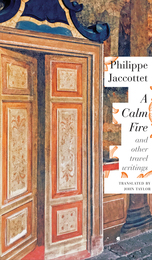
A Calm Fire
and Other Travel Writings
Philippe Jaccottet
Seagull Books, 2018
In these times of heartbreaking violence, clashing religions, and a seemingly never-ending narrative of dichotomy between East and West, wonder at the religion and culture of the Middle East can be in short supply. However, the lyrical and philosophical travel writing in Swiss poet Philippe Jaccottet’s Calm Fire rekindles it, lifting us out of our ordinary locales and stories of violent conflict in the Middle East. Jaccottet’s poetic descriptions explore the rich cultural worlds of Syria, Lebanon, Egypt, and Israel, giving us uncommon glimpses into countries so often associated with turmoil, death and destruction. Expressing a poet’s admiration for the ecstasies of faith and a philosopher’s skepticism of these seemingly transformative feelings, Jaccottet dives deep into the religious cultures of the places he visits.
Ultimately, whether in his native Swiss Alps or among the cedars of Lebanon, the same question pervades Philippe Jaccottet’s work: How should we live? More than a simple palliative to a depressing news cycle, Calm Fire captures a true sense of place by celebrating and pondering ways of life through the immersive experience of travel.
Ultimately, whether in his native Swiss Alps or among the cedars of Lebanon, the same question pervades Philippe Jaccottet’s work: How should we live? More than a simple palliative to a depressing news cycle, Calm Fire captures a true sense of place by celebrating and pondering ways of life through the immersive experience of travel.
[more]

Dying of Thinking
The Last Kingdom IX
Pascal Quignard
Seagull Books, 2023
A deeply contemplative work devoted to thinking from one of the foremost literary figures of contemporary France.
Dying of Thinking is the ninth volume of Pascal Quignard’s Last Kingdom series. It explores three themes: how thought and death coincide, how thought is close to melancholy, and how thought takes shelter near traumatism. One who thinks, Quignard shows us, “compensates” for a very ancient abandonment. Even as a dream is a meaning whose disorderly, condensed, paradoxical images intuit something which has preceded sleep and which returns in them, thought is a meaning which uses words that are written, re-transcribed, dissected, etymologized and neologized. Throughout the Last Kingdom series, Quignard has sought to experience another way of thinking, one that has nothing to do with philosophy, a way of attaching himself “literally” to texts and of progressing by decomposing the imagery of dreams. Dying of Thinking is the heart of this quest.
Dying of Thinking is the ninth volume of Pascal Quignard’s Last Kingdom series. It explores three themes: how thought and death coincide, how thought is close to melancholy, and how thought takes shelter near traumatism. One who thinks, Quignard shows us, “compensates” for a very ancient abandonment. Even as a dream is a meaning whose disorderly, condensed, paradoxical images intuit something which has preceded sleep and which returns in them, thought is a meaning which uses words that are written, re-transcribed, dissected, etymologized and neologized. Throughout the Last Kingdom series, Quignard has sought to experience another way of thinking, one that has nothing to do with philosophy, a way of attaching himself “literally” to texts and of progressing by decomposing the imagery of dreams. Dying of Thinking is the heart of this quest.
[more]
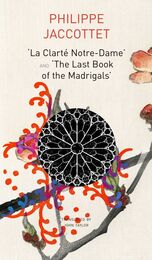
"La Clarté Notre-Dame" and "The Last Book of the Madrigals"
Philippe Jaccottet
Seagull Books, 2022
The last works of the last great classic European poet now available in English.
In his 96th and final year, and with the help of the poet José-Flore Tappy, celebrated Swiss poet Philippe Jaccottet finished two manuscripts-in-progress, one in prose and one in poetry, both of which are presented in this volume in John Taylor’s sensitive translation.
The first work, “La Clarté Notre-Dame,” takes off from the “pure, weightless, fragile, yet crystal-clear tinkling” of a monastery bell heard during a walk with friends. With this thought-provoking sound as a leitmotiv, Jaccottet looks back on a life of writing, reading, and scrutinizing humankind’s existential and spiritual aspirations. He sets these concerns against his equally lifelong preoccupation with “the rise of evil in today’s world,” notably in Syria. Composed in a baroque style, the verse poems collected in “The Last Book of Madrigals” explore love. Jaccottet returns in spirit to Italy, the country which for him symbolizes happiness and sensuality. As he evokes amorous attraction, he conjures up Monteverdi’s madrigals, one of Dante’s little-known rhymes, and Giuseppe Ungaretti’s last poem. Reinventing and commenting on these works, Jaccottet meditates on old age, approaching death, despair, and the persistence of love.
Together, both works grapple with devastating darkness, but as Tappy observes in her afterword, however, Jaccottet’s “greatest force” was “his perpetually renewed desire, during the most terrifying night, to head for the light.”
In his 96th and final year, and with the help of the poet José-Flore Tappy, celebrated Swiss poet Philippe Jaccottet finished two manuscripts-in-progress, one in prose and one in poetry, both of which are presented in this volume in John Taylor’s sensitive translation.
The first work, “La Clarté Notre-Dame,” takes off from the “pure, weightless, fragile, yet crystal-clear tinkling” of a monastery bell heard during a walk with friends. With this thought-provoking sound as a leitmotiv, Jaccottet looks back on a life of writing, reading, and scrutinizing humankind’s existential and spiritual aspirations. He sets these concerns against his equally lifelong preoccupation with “the rise of evil in today’s world,” notably in Syria. Composed in a baroque style, the verse poems collected in “The Last Book of Madrigals” explore love. Jaccottet returns in spirit to Italy, the country which for him symbolizes happiness and sensuality. As he evokes amorous attraction, he conjures up Monteverdi’s madrigals, one of Dante’s little-known rhymes, and Giuseppe Ungaretti’s last poem. Reinventing and commenting on these works, Jaccottet meditates on old age, approaching death, despair, and the persistence of love.
Together, both works grapple with devastating darkness, but as Tappy observes in her afterword, however, Jaccottet’s “greatest force” was “his perpetually renewed desire, during the most terrifying night, to head for the light.”
[more]
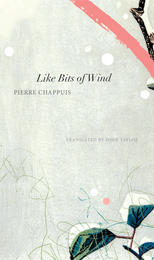
Like Bits of Wind
Selected Poetry and Poetic Prose, 1974-2014
Pierre Chappuis
Seagull Books, 2016
One of the central figures from a remarkable generation of French-language poets, Pierre Chappuis has thus far only been represented in English translation in fragments: a few poems here and there in magazines, online reviews, and anthologies. Like Bits of Wind rights that wrong, offering a generous selection of Chappuis’s poetry and prose from the past forty years, drawn from several of his books. In these pages, Chappuis delves into long-standing questions of the essence of life, our relationship to landscape, the role of the perceiving self, and much more. His skeletal, haiku-like verse starkly contrasts with his more overtly poetic prose, which revels in sinuous lines and interpolated parentheticals. Together, the different forms are invigorating and exciting, the perfect introduction for English-language readers.
[more]
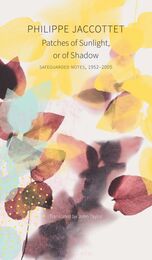
Patches of Sunlight, Or of Shadow
Safeguarded Notes, 1952–2005
Philippe Jaccottet
Seagull Books, 2020
Philippe Jaccottet’s newest work follows in some ways the approach of Seedtime, his recent two-volume collection of notebooks. Similarly comprising on-the-spot jottings, philosophical reflections, literary commentary, dream narratives and sundry “notes,” this book nonetheless differs from the preceding volumes in that the Swiss poet includes more personal material than ever before. Drawing on unpublished notebooks from the years 1952–2005, Jacottet offers here passages about his family, the death of his father-in-law and of his mother, his encounters with other major poets—such as René Char, Francis Ponge, Jean Tardieu, and his friends Yves Bonnefoy and André du Bouchet—and his trips abroad, as well as, characteristically, his walks in the countryside around the village of Grignan, in the south of France, where he has lived since 1953. For a poet who has been notoriously discreet about his life, this book offers unexpected glimpses of the private man. Above all, the entries in this notebook show how one of the greatest European poets grapples with the discouraging elements of existence, counterbalancing them by recording fleeting perceptions in which “something else,” almost like a threshold, seems present.
[more]
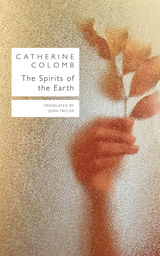
The Spirits of the Earth
Catherine Colomb
Seagull Books, 2016
Swiss novelist Catherine Colomb is known as one of the most unusual and inventive francophone novelists of the twentieth century. Fascinated by the processes of memory and consciousness, she has been compared to that of Virginia Woolf and Marcel Proust. The Spirits of the Earth is the first English translation of Colomb’s work and its arrival will introduce new readers to an iconic novel.
The Spirits of the Earth is at heart a family drama, set at the Fraidaigue château, along the shores of Lake Geneva, and in the Maison d’en Haut country mansion, located in the hills above the lake. In these luxe locales, readers encounter upper-class characters with faltering incomes, parvenues, and even ghosts. Throughout, Colomb builds a psychologically penetrating and bold story in which the living and the dead intermingle and in which time itself is a mystery.
The Spirits of the Earth is at heart a family drama, set at the Fraidaigue château, along the shores of Lake Geneva, and in the Maison d’en Haut country mansion, located in the hills above the lake. In these luxe locales, readers encounter upper-class characters with faltering incomes, parvenues, and even ghosts. Throughout, Colomb builds a psychologically penetrating and bold story in which the living and the dead intermingle and in which time itself is a mystery.
[more]
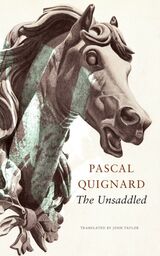
The Unsaddled
Pascal Quignard
Seagull Books, 2023
A captivating and wide-ranging interpretation of accidental dismounting.
In Pascal Quignard’s writing, philology hunts for wild game in a dark forest. The Unsaddled, which features horses as its central figure, is no exception. Taking off from puns, multifarious imagery, and metaphorical meanings—“to be baffled,” “to be thrown”—that the book’s title provides, Quignard focuses on life-changing moments. We meet George Sand (whose father died after being thrown from his horse), Saint Paul, Abelard, Agrippa d’Aubigné, and countless other writers, philosophers, theologians, or kings who fell off their horses—not to forget Jean-Jacques Rousseau, who was knocked over by a dog. Being “unsaddled” can also be associated, as Quignard shows in regard to Nietzsche, with an “overturning” of values. Scenes of war, hunting, “fleeing” or sexuality—“When lovers have a horse ride, they gallop in another world”—come before our eyes, each time from those unsettling vantage points that Quignard knows how to find. As ever, he ranges far and wide in his intense quest, taking examples from across human history, from the neolithic age to his own childhood memories of postwar Le Havre in northern France.
In Pascal Quignard’s writing, philology hunts for wild game in a dark forest. The Unsaddled, which features horses as its central figure, is no exception. Taking off from puns, multifarious imagery, and metaphorical meanings—“to be baffled,” “to be thrown”—that the book’s title provides, Quignard focuses on life-changing moments. We meet George Sand (whose father died after being thrown from his horse), Saint Paul, Abelard, Agrippa d’Aubigné, and countless other writers, philosophers, theologians, or kings who fell off their horses—not to forget Jean-Jacques Rousseau, who was knocked over by a dog. Being “unsaddled” can also be associated, as Quignard shows in regard to Nietzsche, with an “overturning” of values. Scenes of war, hunting, “fleeing” or sexuality—“When lovers have a horse ride, they gallop in another world”—come before our eyes, each time from those unsettling vantage points that Quignard knows how to find. As ever, he ranges far and wide in his intense quest, taking examples from across human history, from the neolithic age to his own childhood memories of postwar Le Havre in northern France.
[more]
READERS
Browse our collection.
PUBLISHERS
See BiblioVault's publisher services.
STUDENT SERVICES
Files for college accessibility offices.
UChicago Accessibility Resources
home | accessibility | search | about | contact us
BiblioVault ® 2001 - 2024
The University of Chicago Press









